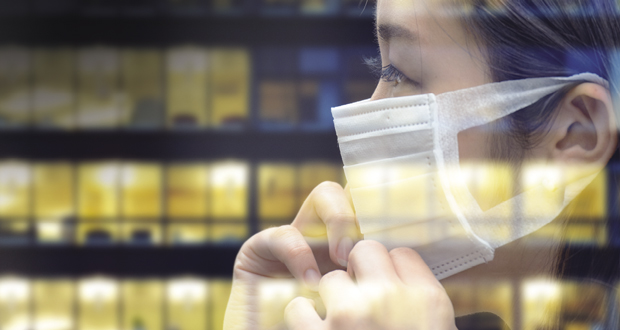 CATERING AND HOSPITALITY SECTOR’S VIEW
CATERING AND HOSPITALITY SECTOR’S VIEW
IAN THOMAS
CEO, BARTLETT MITCHELL
The pandemic has undoubtedly been a time for reflection, both professionally and personally. The hospitality sector, specifically contract catering, has adapted, sometimes daily, to the rapidly changing requirements set out by the Government. However, most importantly, we have really tapped into our agility as an organisation; paying close attention to the needs of our clients and changing behaviour of guests in our restaurants across the UK.
Throughout this pandemic and the post lockdown period, we’ve learned that people still see food as that social glue. Food and eating plays such a significant role in all of our personal lives and we have seen how this has translated to the workplace too where, even with the restrictions in place, companies and organisations still see eating together as playing a central role in how they converse, discuss and collaborate.
While we understand the challenges around people returning to the workplace now, we do believe that this won’t be the case forever. During the lockdown, we’ve truly understood the value of being together, in person. People need human interaction and I’m sure that we will see this translate to working practices once this pandemic is eventually behind us.
Understanding the benefits of being together has never been greater. Not only does this help in terms of engagement with teams, but it also makes us more productive. While many people initially loved the idea of working from home, there is plenty of evidence now to suggest that, for some functions, we are not as productive as we would be if we had ‘office time’. This is a major learning for all of us as the theory had not been truly tested before.
Clearly, mental health and wellbeing will also play a major role in how the new world will look like. This period has just highlighted how seriously organisations will need to take this. Workplace hospitality can clearly play an important role to facilitate this. Of course, things will be different, and we will see more working from home, but not full-time. People will still get together so our working spaces may shift as a result of this.
For caterers, we will play an integral role in the transition back to the new version of the workplace, and the subsequent engagement thereafter. As is the case with so many businesses in our sector, we are working on developing a proposition which is tailored to the new behaviours and ways of working. Whether its onsite, delivered-in, or delivered at home, we see the changes as being evolutionary rather than revolutionary. The model we deployed before worked well, but will need to be tailored. What we have learned during this period is that ‘bespoking’ an offer has never been more important.
Clients and businesses will all have a very different need for change – we need to tap into where they are in their journey. We know that, when teams go into the office, their experience needs to be incredible. This is why businesses will need to play ever closer attention to their culture and sense of community. Catering and hospitality will be integral to this.
 THE IWFM’S VIEW
THE IWFM’S VIEW
LINDA HAUSMANIS
CEO, INSTITUTE OF WORKPLACE AND FACILITIES MANAGEMENT
One of the key challenges of the crisis has been maintaining a successful workplace strategy in the absence of a physical workspace. Maintaining productivity and keeping good work going throughout the disruption has been key to success; it has taken Herculean efforts to ensure employees’ remote working environments are suitable for effective working. Few believe things will return exactly as before, so maintaining the best of this will be crucial as we move forward and the concept of agile working becomes a post-pandemic norm.
To this end, one of the key lessons is the vital importance of embracing technology. Video conferencing software has been crucial to enabling successful remote working and, as many embrace more flexible working policies moving forwards, will continue to be key to business continuity. Yet perhaps of equal importance has been the growing importance of understanding data; to allow us to garner better customer insights so as to truly respond to our end users and their needs.
The crisis has also seen an increased focus placed on individual and social wellbeing. With the pandemic up-ending traditional working set ups, it is important that organisations remember that responsibility for employee wellbeing covers all workspaces and doesn’t stop at the office door. Those who have adopted a culture of trust, transparency and openness – listening to their employees and ensuring they are kept updated throughout this period of uncertainty – have been most effective in maintaining employee engagement.
Sustainability within the workplace has also come to the forefront throughout the crisis. This has long been a focus area for the facilities profession, with FMs seeking to make business cases to create real changes to practice. It is essential that net zero and other sustainability goals remain in focus, and the opportunities presented by COVID-19 should act as a driver in creating more sustainable working environments.
Finally, the change in the working environment has meant a shift in the skills many require to do their job successfully – from frontline staff adhering to social distancing regulations to changing leadership and management competencies to manage a workforce from afar. With the future of the workplace likely forever changed, it’s more important than ever to ensure that workplace and facilities professionals, alongside the staff they support, have the opportunity to develop the right skills for tomorrow’s challenges.
The crisis is far from over, but it is clear that many of its impacts will leave a permanent mark on the way we work. The “super connecter” profession of workplace and facilities management will continue to hold the key to bringing together the space, culture and technology aspects of work into a workplace strategy that enables organisations and individuals to remain productive, whatever their setting.





